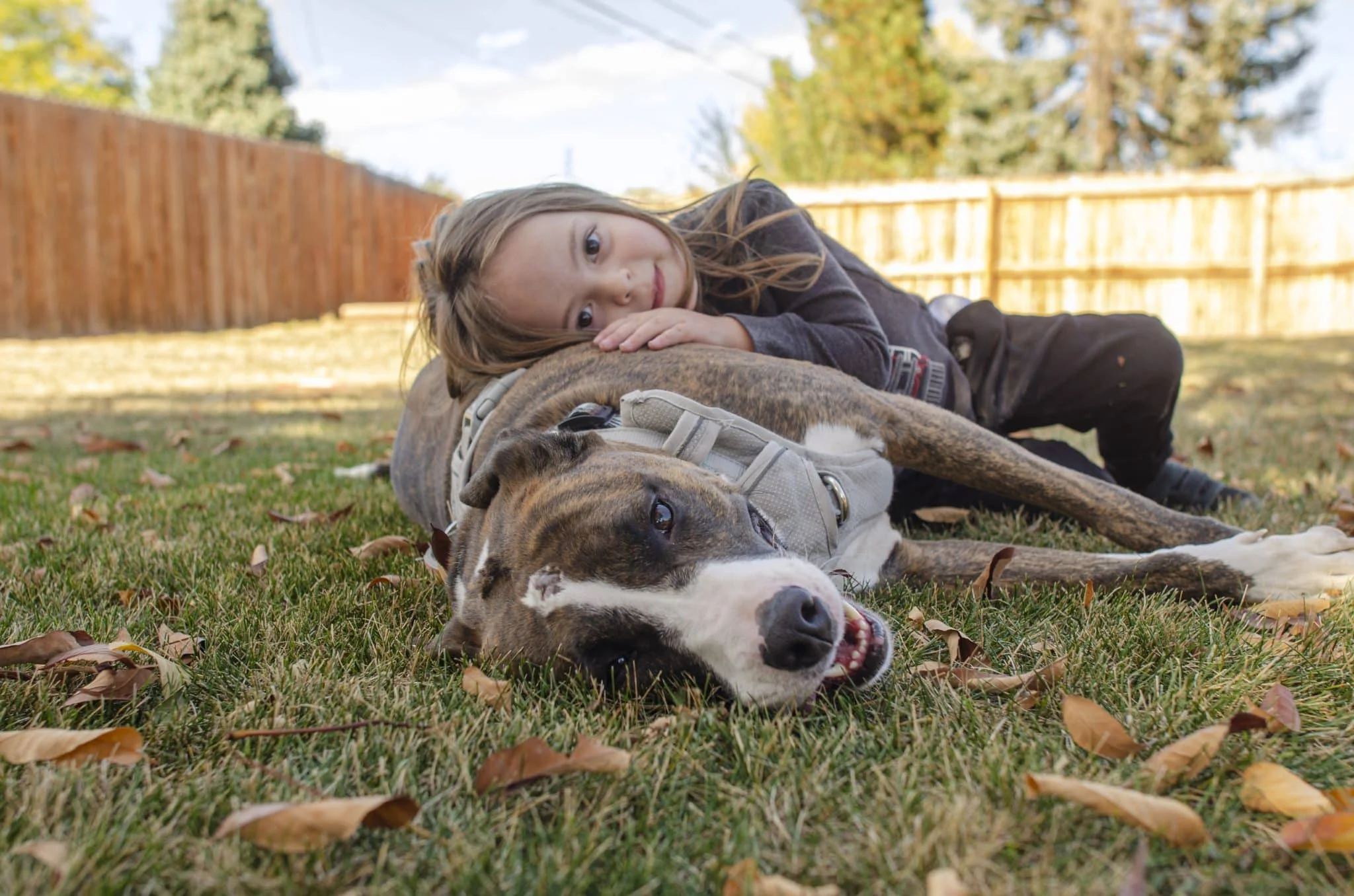
That was the bio that hung outside Nahla’s kennel at the Dumb Friends League three years ago. Now, it’s more than just her wish list – it’s her dream come true. The 4-year-old brindle Lab-mix, known previously as Kona, lives with an adoring adoptive family, including one playmate who fits her like a glove. Logan – just 4 years old himself – is a bright, spunky, and affectionate boy on the autism spectrum. Together, they share a heartwarming bond that has proven to be mutually beneficial.
Logan and Nahla became friends almost instantly. The high-energy pup who used to spend her days chasing chickens now gets her kicks from playing with Logan. She also offers him companionship and a much-needed sense of calm in times of stress or frustration. Studies show that autistic children often have difficulties with social communication, anxiety, and managing their emotions and behaviors. “Somehow [Nahla] just knows how to help regulate him. She’s so gentle,” said Logan’s mother, Michelle. “She’s not specifically trained [as a service dog], it’s just her personality, and it has come out more and moreover the years.”
Nahla’s excitable, fun-loving nature makes her ability to adapt to Logan’s needs even more remarkable. “As [Logan’s] gotten bigger and some of his struggles and difficulties have emerged, Nahla almost seems to adjust her own temperament to him,” said Michelle. In turn, Logan gives Nahla the frolic and unconditional affection she needs, often hugging her with his whole body. “Initially, people can be a bit afraid of her. She has a big bark, and that reaction is sometimes a barrier to her getting much socialization with people and other dogs. Logan provides that love and attention,” Michelle remarked.
Like countless families, things shifted dramatically for Michelle, Logan, and Nahla when COVID-19 emerged in early 2020. The family had recently moved into a new home, and Michelle’s job as a healthcare worker became increasingly demanding and complex. In short, Logan’s established routine – so critical to his well-being – took a hit, making it difficult for him to adjust to all the uncertainties. The one constant in his life was Nahla, and their bond grew significantly stronger throughout the pandemic. “[Nahla and Logan] spent a lot of time playing or just cuddling in the house,” said Michelle. “She helped him through that break-in routine, and she continues to help. We have to feed the dog, make sure she has water, take her out … she has to have her walk. [Logan] needs that repeat and regulation to really get through the day.”
As a child on the autism spectrum, Logan regularly works with occupational and physical therapists to help develop his social, motor, sensory processing, and emotional regulation skills. Michelle said that while he has a home care plan to help him reach these milestones, Nahla’s assistance is unmatched. “He’s motivated to play with her. If he’s running around with her, she’s excited, and that gets him excited, and he’s more likely to do it.” This observation is not surprising; indeed, the opportunity to connect with animals can motivate people to partake in many activities – from therapy to exercise to reading.
Notably, Nahla also provides Logan with a positive “sensory playground.” Gently rubbing her velvety ears and touching her wet nose allows him to practice engaging with the sensory world in ways that feel soothing rather than overwhelming. And when anxiety does take over, Nahla’s right there by his side. “She’ll lay her head on him to give him a little bit of pressure,” said Michelle. Deep touch pressure often helps alleviate the arousal that comes with sensory processing challenges. In fact, after observing the calming effect that squeeze chutes had for cattle, animal scientist and autism advocate Dr. Temple Grandin even created her own deep touch device (or “Hug Machine”) to overcome her sensitivity to touch.
The past three years have been unusual, to say the least, and Michelle continues to marvel at the progress that Logan and Nahla have made together. As someone who has worked professionally with autistic children, Michelle understands the importance of nurturing her son’s early social-emotional development. Nahla has been an incredible partner in helping Logan enhance his communication and empathy skills. “Just the capacity to have a connection with [someone] before he was really able to learn how to do that with peers or even some family members [has been so helpful],” she said. Moreover, Michelle has seen Logan develop perspective-taking when learning to respond appropriately to Nahla’s wants and needs. This crucial building block of empathy has only strengthened the trust and understanding they share.
With Logan and Michelle, it’s clear that Nahla now has her dream home: an active, loving family for life. But it also appears she’s found her calling. Nahla helps Logan provide and receive care (including gentle touch), which has helped him gain skills that will open the doors to a healthy and independent life. The true love and belonging they have found in one another inspire all of us here at the League. Please help us continue to touch the lives of animals like Nahla by supporting our mission to end pet homelessness and animal suffering!
Families of children on the autism spectrum should carefully consider their child’s needs and sensitivities before choosing to adopt a pet. The Dumb Friends League is committed to helping you find your perfect match – it’s good for you, your family, the animal, and our shared community.
